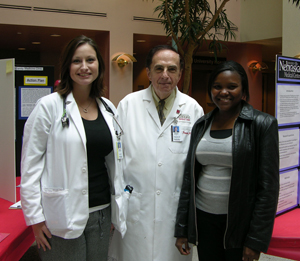 |
UNMC Chancellor Harold M. Maurer, M.D., center, with fourth-year medical students Christelle Iboudo, right, and Lindsay Northam at the annual Family Medicine Rural Rotation Poster Display on Wednesday. Iboudo and Northam each received awards of $250 for their presentations, which sprang from their experiences during rotations in rural Nebraska during their third year of medical school. |
Iboudo and Northam each have the opportunity to compete in a statewide contest at the The Nebraska Academy of Family Physicians Conference in March.
“Since the state of health care quality in the United States is a major concern for physicians, providers, patients, medical educators, and payers, this project was designed to give our medical students an opportunity for ‘hands on’ learning about health care quality and how to improve it,” said Paul Paulman, M.D., assistant dean for clinical skills and quality and professor and predoctoral director, UNMC Department of Family Medicine. “I commend our student winners and participants in this year’s poster contest for their excellent projects.”
Dr. Paulman also lauded Barbara Goodman for her administration of the project and the Nebraska Academy of Family Physicians and UNMC’s Department of Family Medicine for their support.
Iboudo received her award from the UNMC Department of Family Medicine for her presentations on how physicians’ attitudes and beliefs affect vaccination rates in rural areas.
She found that physicians’ personal beliefs about the effectiveness of vaccinations contributed to whether they would recommend vaccinations for their patients.
Northam’s award came from the Nebraska Academy of Family Physicians.
Her presentation focused on the problem of improper lipid management of patients with type 2 diabetes in rural areas.
To remedy the problem she proposed a multi-step plan that would have clinics identify four months per year — one each quarter (January, April, July, October) — as diabetes care months and dedicate one day each week to the care of diabetic patients.